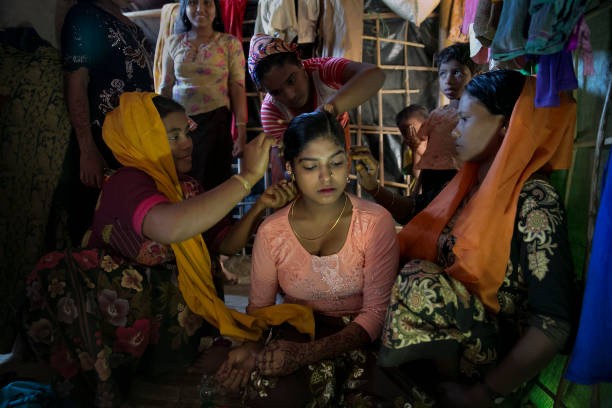Underage Rohingya girls experienced abuse in arranged marriages in Malaysia, which feels like a prison for the 14-year-old girl who was raped by her 35-year-old husband nearly every night.
The Rohingya girl sacrificed herself to save her family last year by embarking on a terrifying journey from her homeland of Myanmar to a country she had never seen to marry a man she had never met.
Underage Rohingya Girls Experience Abuse in Arranged Marriages
Myanmar's military attacked the country's Rohingya Muslim minority in 2017, and the girl had no choice but to offer herself because her family was impoverished and hungry. Her neighbor found a man in Malaysia who would pay the 18,000 ringgit ($3,800) fee for the girl's passage and send money to her family for food after their marriage.
The girl hugged her family goodbye and climbed into a trafficker's car packed with children. According to the Associated Press, underage Rohingya girls forced into arranged marriages were increasing in Myanmar and neighboring Bangladesh's refugee camps.
She shared that his husband would lock her in the bedroom in the morning and leave her there all day with no water or food. He would only return at night to rape her again.
According to The Independent, they found 12 young Rohingya brides who arrived in Malaysia in 2022 in interviews. The youngest Rohingya bride was 13.
The girls who were interviewed claimed that their controlling husbands rarely let them outside. Others said they were beaten and raped during their stay in Malaysia, and five said their husbands abused them.
Furthermore, half of the girls were pregnant or had babies, despite most saying they were not prepared for motherhood.
"This was my only way out," a 16-year-old girl said, who watched Myanmar's soldiers burned her house and killed her aunt. She added that she was not ready to be married, but she had no choice.
According to the United Nations refugee agency, the Rohingya were increasingly fleeing, primarily female. During the 2015 Andaman Sea boat crisis, the vast majority of passengers were men, but this year, more than 60% of the Rohingya who survived the Andaman crossing were women and children.

Rohingya Women's Advocate Speak Out
Save the Children reported that child marriage was one of the agency's most reported concerns among camp residents.
Shaheen Chughtai, Save the Children's Regional Advocacy and Campaigns Director for Asia, said they have seen a rise in cases of child trafficking. She claimed that girls were more vulnerable to these cases and often linked to being married off in different territories.
Nasha Nik, executive director of the Rohingya Women Development Network, who has worked with hundreds of child brides in recent years, confirmed that there were a lot of Rohingyas coming in to get married.
Malaysia was not a signatory to the United Nations refugee convention, so abused girls in the country were considered illegal immigrants. Reporting their assaults to authorities would put them at risk of being thrown into one of Malaysia's detention centers.








